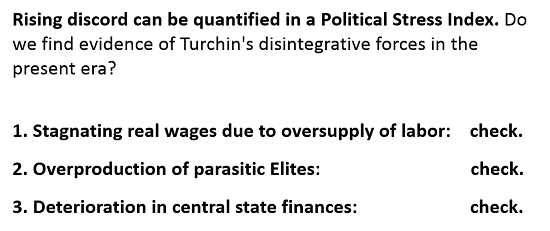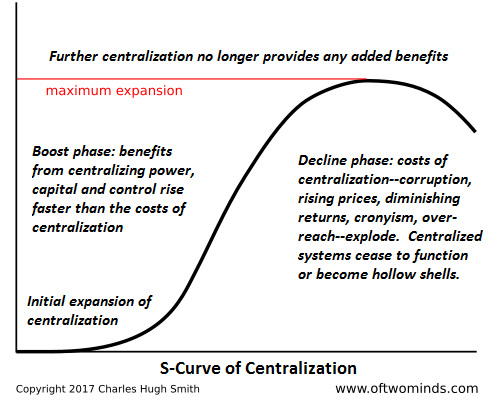The system is disintegrating, and slapping a "reformist" coat of paint over the dryrot cannot renew the structural timbers that have rotted to their very core.
I confess to being amused by the mainstream media's implicit view that everything would be peachy if only Trump wasn't president. Memo to MSM: the nation is fragmenting for reasons that have nothing to do with who's president, or indeed, which party is the majority in Congress, who sits on the Supreme Court, or any other facet of governance.
The nation is fracturing and fragmenting because the Status Quo is failing the majority of the citizenry. The protected few are reaping all the benefits of the Status Quo, at the expense of the unprotected many.
As I have outlined many times, this unsustainable asymmetry is the only possible outcome of our socio-economic system, which is dominated by these forces:
1. Globalization--free flow of capital, labor arbitrage
2. Nearly free money from central banks for financiers and corporations
3. Pay-to-play "democracy"
4. State protected cartels that privatize gains and socialize losses
5. A system stripped of self-correcting feedback and accountability
Once you understand the inputs and structure, you realize there is no other possible output other than unsustainably expanding debt and wealth/income inequality. Policy tweaks cannot change the output; all they do is provide an illusion of reform that serves the need of those at the top to obscure the systemic injustices and unsustainability of the extractive, exploitive, predatory, parasitic system that's enriching them.
What do people do when centralized systems fail to deliver what was promised? They fragment into smaller "tribes" and find fewer reasons to cooperate in centralized systems. As historian-economist Peter Turchin explained in his 2016 book
Ages of Discord, human history manifests cycles of social disintegration and integration in which the impulse to cooperate in large social structures waxes and wanes.
Turchin identified 25-year cycles that combine into roughly 50-year cycles, comparable (though not identical with) Kondratieff's proposed economic cycles.
These 50-year cycles are part of longer 150 to 200-year cycles that move from cooperation through an age of discord and disintegration to a new era of cooperation.
Turchin's model identifies three primary forces in these cycles:
1. An over-supply of labor that suppresses real (inflation-adjusted) wages
2. An overproduction of essentially parasitic Elites
3. A deterioration in central state finances (over-indebtedness, decline in tax revenues, increase in state dependents, fiscal burdens of war, etc.)
These combine to influence the social order, which is characterized in eras of discord by declining loyalty to self-serving special interests (disintegration) and in eras of cooperation by a willingness to compromise for the good of the entire society (integration).
As I have often explained, centralization is now a disruptive drag rather than a benefit. Centralization provided widespread gains in efficiencies in its boost phase, but now that it is sliding down the S-curve, it only benefits the few at the expense of the many.
The returns on centralization have diminished to less than zero: centralization's primary outputs are now corruption, lack of accountability, cronyism, complexity moats and bureaucratic thickets that obscure the self-serving nature of centralized power.
The structural failure of our political-economic system cannot be remedied by electing a new president or swapping failed political parties. The system is disintegrating, and slapping a "reformist" coat of paint over the dryrot cannot renew the structural timbers that have rotted to their very core.
Identifying cycles can be a parlor game, but there is no denying that we're deep into a disintegrative phase that will probably come to a head between 2021 and 2029.
If you found value in this content, please join me in seeking solutions by becoming a $1/month patron of my work via patreon.com.
NOTE: Contributions/subscriptions are acknowledged in the order received. Your name and email remain confidential and will not be given to any other individual, company or agency.
Thank you, Ryan R. ($5/month), for your splendidly generous re-subscription to this site -- I am greatly honored by your steadfast support and readership.
| |
Thank you, Eric T. ($80), for your outrageously generous contribution to this site -- I am greatly honored by your longstanding support and readership.
|




























